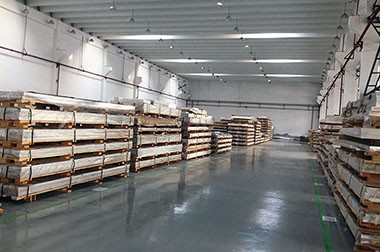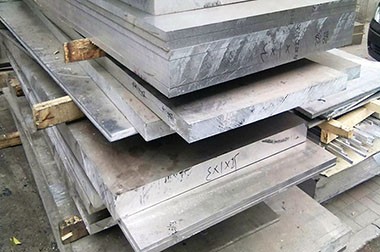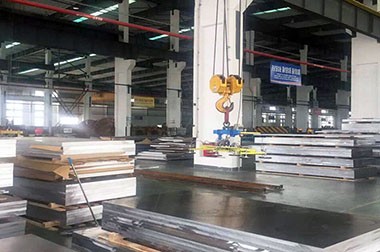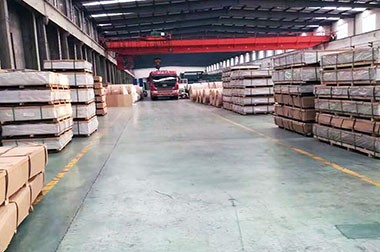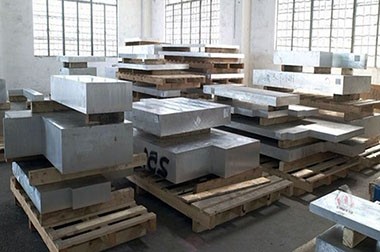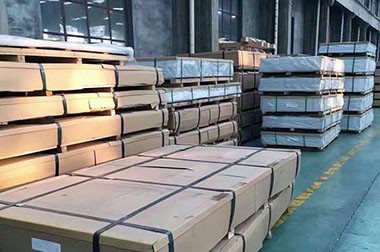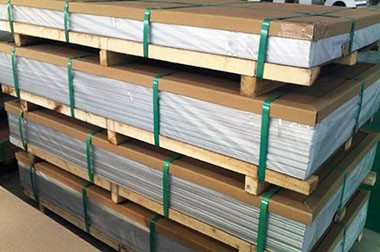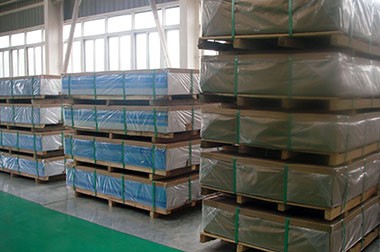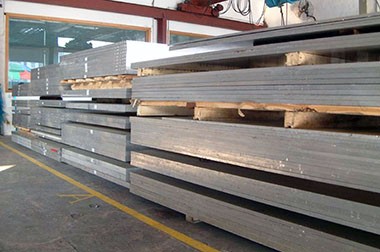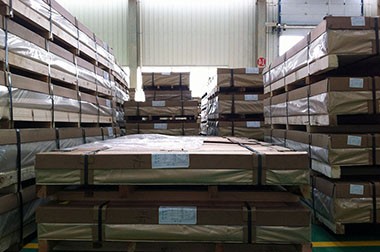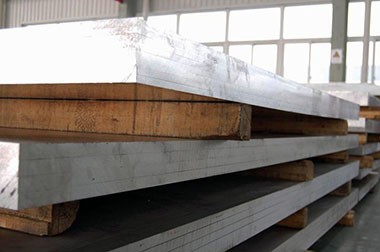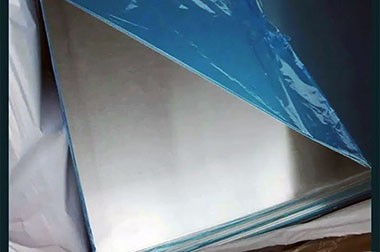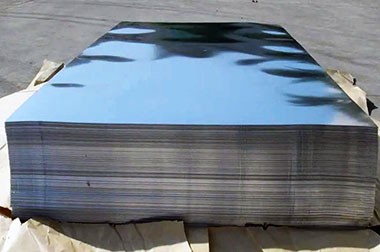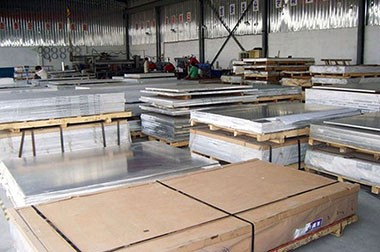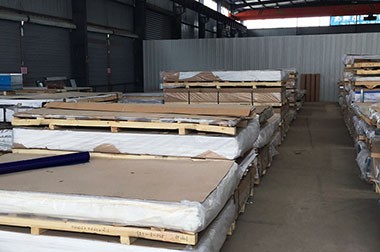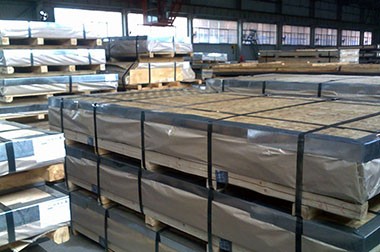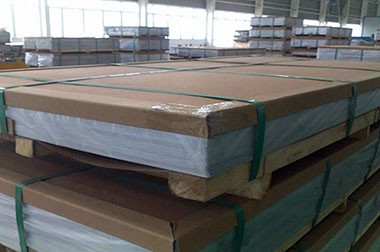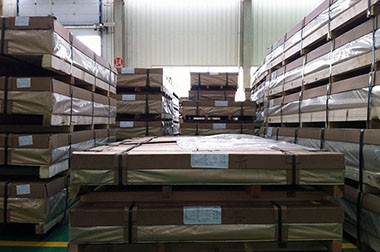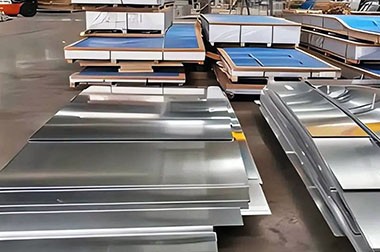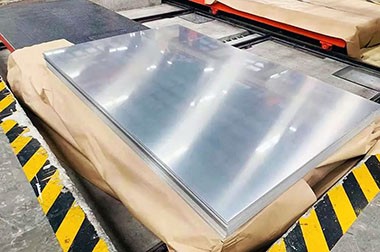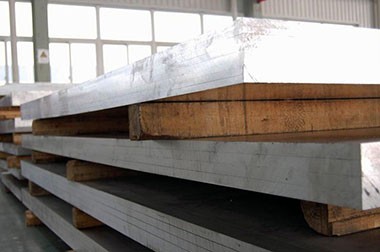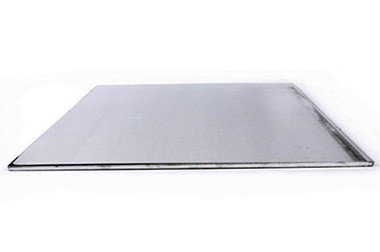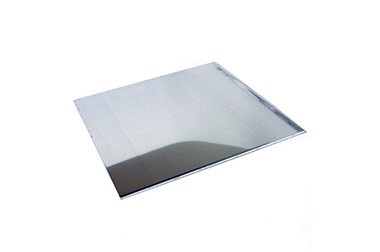7010 T7451 T7651 Aerospace Aluminum Plate
7010 is a modified version of 7050 aluminum alloy, achieving a balance of strength and processing adaptability by reducing copper content and optimizing the Zn/Mg ratio.
7010 aluminum alloy is a high-strength forged 7000 series alloy that combines excellent fatigue performance and outstanding stress corrosion resistance, making it an ideal choice for critical aerospace components subjected to cyclic loads and corrosive environments. Its primary alloying element is zinc (5.7–6.7%), supplemented by magnesium (2.1–2.6%) and copper (1.5–2.0%), with trace amounts of zirconium and other elements added to refine the grain structure and improve toughness. In the T6 temper, 7010 exhibits a yield strength of approximately 530 MPa and an ultimate tensile strength exceeding 565 MPa, but experiences strength degradation above 200°C, limiting its use in high-temperature applications. Typical applications include closed-die forgings, large forged bars, and key structural components in aircraft fuselages, wing spars, and landing gear fittings.
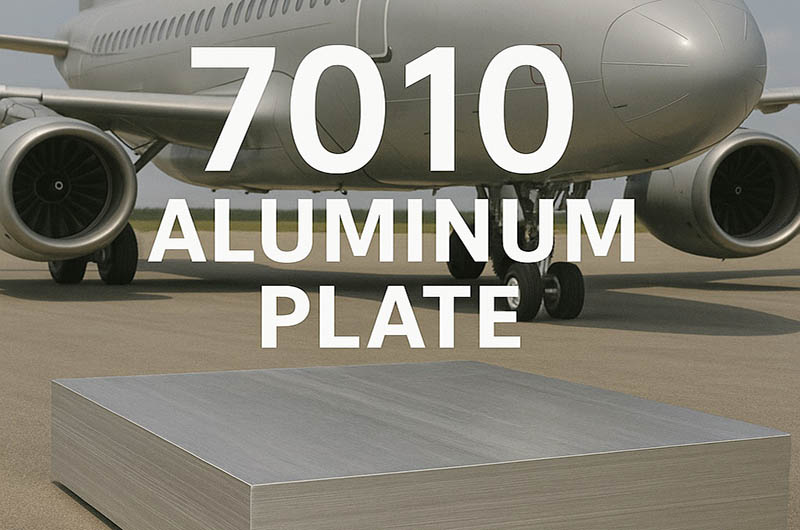
- Main Advantages: High damage tolerance and fatigue resistance while maintaining relatively good ductility (elongation approx. 12%).
- High strength-to-weight ratio, excellent fatigue and stress corrosion cracking resistance, and validated performance on major aircraft platforms.
- Limitations: Lower high-temperature strength above approximately 200°C compared to lower-strength aluminum alloys, and moderate machinability.
7010 aerospace aluminum plate is a high-strength, corrosion-resistant aluminum alloy primarily used in the aerospace and military industries. Its notable feature is that it exhibits excellent mechanical properties after strengthening treatment, making it particularly suitable for lightweight, high-strength structural materials.
7010 aluminum alloy is a material with extremely high strength and excellent fatigue strength, widely used in aerospace industry for high-strength components. Its main characteristics are high strength, high fatigue strength, and good resistance to stress corrosion, but it is not suitable for use in high-temperature environments.
| Property | Description |
| Fatigue Strength | Good |
| Mechanical Strength | Good |
| Temperature Suitability | For low temperature applications |
7010 aluminum alloy is similar to 7050 aluminum alloy, but with higher strength, better fatigue performance, and improved resistance to stress corrosion. Its characteristics make it suitable for producing high-strength components for low-temperature applications that require both high strength and good corrosion resistance, such as in aerospace. However, its application is limited in high-temperature environments.
The Properties of 7010 Aluminium Alloy
- High Strength and High Fatigue Strength: 7010 aluminum alloy outperforms many other aluminum alloys in strength and fatigue strength, especially in low-temperature environments.
- Stress Corrosion Resistance: This alloy has good resistance to stress corrosion, making it suitable for applications that require both strength and corrosion resistance.
- Temperature Limitations: Despite its extremely high strength, the strength of 7010 aluminum alloy significantly decreases under high-temperature conditions, making it unsuitable for high-temperature service environments.
- Forging Properties: As a forging alloy, 7010 aluminum alloy is primarily used in manufacturing high-strength components for aerospace and similar fields, maintaining excellent mechanical properties, especially in low-temperature conditions.
- Mechanical Properties: 7010 aluminum alloy has extremely high strength and fatigue strength, making it suitable for handling repeated loads.
- Alloy Composition: 7010 aluminum alloy belongs to the 7000 series, with zinc as the primary alloying element, typically used for forging products.
- Lightweight: Compared to traditional steel, aluminum alloy has a lower density, effectively reducing structural weight and improving aircraft performance.
- Workability: This alloy has good workability and can be processed using heat treatment, welding, and other processes to meet various manufacturing needs.
- Heat Treatment Strengthening: 7010 aluminum alloy can be strengthened through heat treatment processes (such as T6 temper) to improve its strength and hardness.
Specification of Haomei 7010 aerospace aluminum plate
| Item | Specification |
| Aluminum 7010 Sheet/Plate Temper | T7451, T7351, T6, T651 |
| Product Supply Forms | Hot-rolled plates, pre-stretched plates, large-size extruded profiles |
| Specification Range | Plate thickness 1–450 mm; bar diameter 5–500 mm |
| Aluminum 7010 Sheet & Plate Specifications | AMS4083, AMS QQ-A-250/19, ASTM B209/B209M |
| Aluminum 7010 Sheet & Plate Dimension Standard | MSRR, AMS, BS, JIS, AISI, ASTM, GB, DIN, EN, etc. |
| Aluminum 7010 Sheets/Plates Typical Width | 1000mm, 1219mm, 1500mm, 1800mm, 2000mm, 2500mm, 3000mm, 3500mm, etc. |
| Aluminum 7010 Sheets/Plates Length | 2000mm, 2440mm, 3000mm, 5800mm, 6000mm |
7010 T7451 Aerospace Aluminum Plate
T7451 is a heat treatment state of 7010 aluminum alloy, having undergone solution treatment, artificial aging, and stabilization.
Annealing + Quenching + Natural Aging + Cold Drawing: After this series of processes, the material exhibits higher resistance to stress corrosion cracking while ensuring high strength.
Characteristics: Aluminum alloys in this state possess good strength and toughness, as well as improved fatigue resistance and corrosion resistance. T7451 aluminum alloy is commonly used in high-strength aerospace structural components, capable of withstanding significant loads and stresses.
The feature of T7451 is that, while ensuring strength, it further enhances the material's corrosion resistance and dimensional stability, making it particularly suitable for aerospace structural components that require long-term corrosion resistance.
7010 T7451 aerospace is suitable for structural components in the aerospace field, such as wings and fuselage frames.
7010 T7651 Aerospace Aluminum Plate
T7651 is another heat treatment state, having undergone solution treatment and aging treatment, usually involving stricter post-treatment steps.
Quenching + Artificial Aging: This treatment process achieves a good balance between strength and toughness in the aluminum alloy.
Compared to T7451, T7651 aluminum alloy offers further improvements in strength and toughness, particularly excelling in fatigue resistance and crack growth resistance. Its microstructure has been optimized to enhance the overall performance of the material.
Good Fatigue Resistance: In high-stress environments, materials in the T7651 state demonstrate excellent fatigue resistance.
Dimensional Stability: The heat treatment method of T7651 improves the material's dimensional stability during complex machining processes, making it suitable for precision aerospace components.
7010 T7651 aerospace is widely used in the aerospace field, especially for components that require extremely high strength and durability.
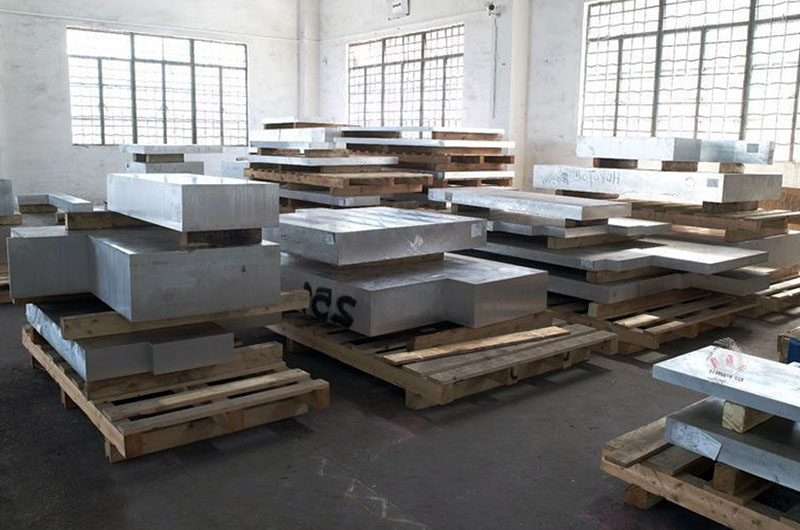
Performance Comparison of 7010 T7651 and T7451 Aerospace Aluminum
| Performance | T7451 | T7651 |
| Tensile Strength | High | Higher |
| Yield Strength | High | Higher |
| Ductility | Good | Better |
| Corrosion Resistance | Good | Better |
| Machinability | Good | Good |
Chemical composition of 7010 aerospace aluminum plate
| Chemical | Alloy 7010 |
| Zn | 5.2%-6.2% |
| Mg | 1.4%-2.1% |
| Cu | 0.1% |
| Mn | 0.1% |
| Cr | 0.04%-0.35% |
| V | 0.18%-0.28% |
| Ti | 0.04%-0.08% |
| Al | Remainder |
Mechanical properties of 7010 aluminum sheet plate
| Temper | Mpa Rm | Mpa Rp0.2 | Elongation A (%) | Hardness HBW Typical |
| T6 | 540 | 490 | 2 | 180 |
| T651 | 540 | 490 | 2 | 180 |
| T7351 | 450 | 360 | 5 |
7010 Aluminum Physical Properties
- Density: 2.81 g/cm³
- Melting Range: Approximately 475 °C
- Modulus of Elasticity: ~71 GPa
- Thermal Conductivity: ~150 W/(m·K)
7010 Aluminum Heat Treatment and Tempers
- T6 (Peak Aging): Solution heat treated followed by artificial aging to achieve maximum strength
- T73 (Over-aging): Enhances stress corrosion cracking resistance at a modest strength cost
- AMS Specifications: AMS 4203, 4204, and 4205 cover various tempers for forgings and bars
7010 Aluminum Corrosion Resistance
- Exhibits excellent resistance to atmospheric and marine corrosion, superior to many other 7000 series alloys
- Stress Corrosion Cracking (SCC) Resistance: High corrosion resistance in T73 temper, ideal for high-stress and corrosive environments
7010 Aluminum Machining Characteristics
- Forgeability: Optimized for closed-die forging into complex shapes while maintaining high strength and toughness
- Machinability: Moderate; typically machined in the T6 temper using standard aluminum machining methods
- Formability: Limited; more suitable for forged products (forgings, bars) rather than large-scale cold forming
7010 Aluminum Fabrication
- Machining: Good machinability in annealed or solution-treated condition
- Welding: Challenging due to crack sensitivity; friction stir welding (FSW) is preferred
- Forging/Extrusion: Lower quench sensitivity compared to 7075, suitable for complex shapes
Comparison of 7010 Aluminum with Similar Alloys
- 7075: Higher Cu content (1.2–2.0%) but lower stress corrosion cracking resistance
- 7050: Higher Zn/Mg ratio; lower quench sensitivity makes it more suitable for thick sections
- 7068: Higher Zn content (7.6–8.4%) and extremely high strength, but lower toughness
7010 Aluminum Standards
- AMS 4345: Aerospace material specification for 7010 forgings
- ASTM B247: Standard specification for aluminum alloy forgings
7010 Aluminum Advantages and Limitations
- Advantages: Balanced strength, toughness, and stress corrosion cracking resistance
- Limitations: Requires careful heat treatment; limited weldability
For applications requiring reliability under high stress and corrosive conditions, especially in aerospace engineering, 7010 aluminum alloy is a strategic choice.
Applications of 7010 Aerospace Aluminum Plate
7010 aluminum plate has various commercial applications, including aircraft structural components, high-stress parts, and fuselage components.
- High-strength aerospace components
- Closed-die forgings
- Large forging billets for aerospace
The 7010 alloy is specifically designed for structural components that must withstand high fatigue stress and corrosion risks.
Aircraft Fuselage Structural Components
7010 aerospace aluminum plates are commonly used in structural components of aircraft fuselage, such as frames and ribs. These parts need to withstand various loads during flight, so the material must have high strength and good rigidity.
Framework, Wing Beams, and Joints of Aerospace Equipment
In the design of spacecraft and aircraft, 7010 aluminum alloy is widely used in structural components such as frameworks, wing beams, and joints. These components not only require high strength but also need to maintain stable performance under extreme temperatures and pressures.
High-Stress Components
7010 aluminum alloy is particularly suitable for high-stress components, such as landing gears and fixed wing parts. These components endure significant impacts and loads during flight and landing, so high-strength materials are necessary to ensure safety and reliability.
Information about 7010 Aerospace Aluminum
| Standard | Designation |
| Aluminum Association (AA) | 7010 |
| European Standard (EN) | EN AW-7010 |
| EN Chemical Name | AlZn6MgCu |
| UNS Number | A97010 |
| British Standard (BS) | DTD5130 |

